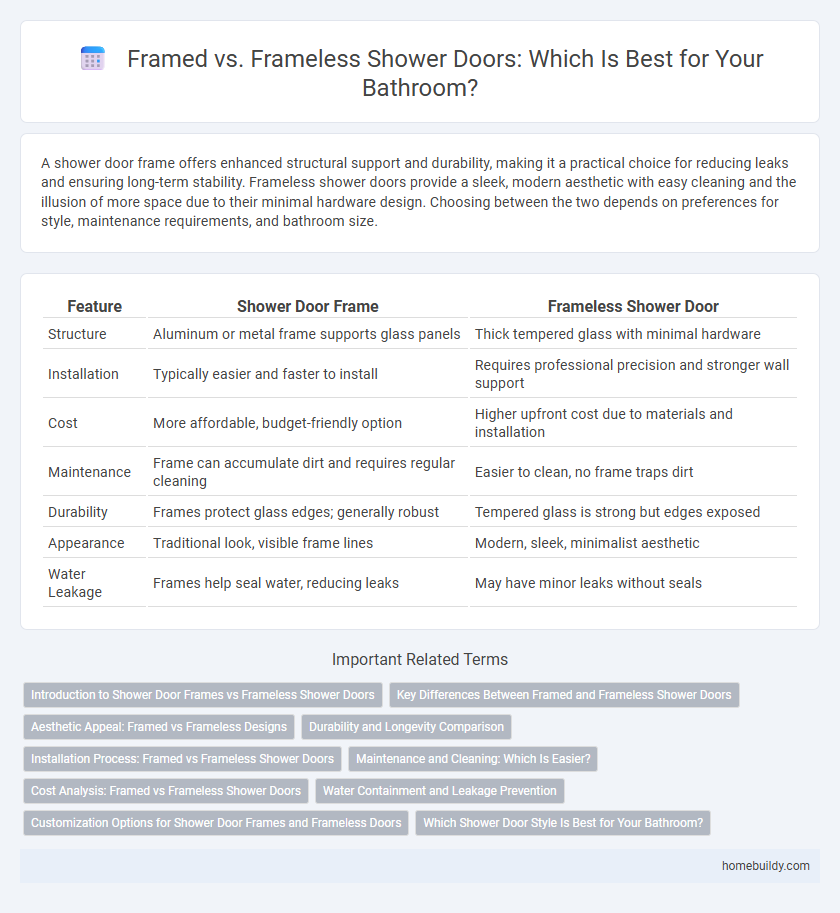A shower door frame offers enhanced structural support and durability, making it a practical choice for reducing leaks and ensuring long-term stability. Frameless shower doors provide a sleek, modern aesthetic with easy cleaning and the illusion of more space due to their minimal hardware design. Choosing between the two depends on preferences for style, maintenance requirements, and bathroom size.
Table of Comparison
| Feature | Shower Door Frame | Frameless Shower Door |
|---|---|---|
| Structure | Aluminum or metal frame supports glass panels | Thick tempered glass with minimal hardware |
| Installation | Typically easier and faster to install | Requires professional precision and stronger wall support |
| Cost | More affordable, budget-friendly option | Higher upfront cost due to materials and installation |
| Maintenance | Frame can accumulate dirt and requires regular cleaning | Easier to clean, no frame traps dirt |
| Durability | Frames protect glass edges; generally robust | Tempered glass is strong but edges exposed |
| Appearance | Traditional look, visible frame lines | Modern, sleek, minimalist aesthetic |
| Water Leakage | Frames help seal water, reducing leaks | May have minor leaks without seals |
Introduction to Shower Door Frames vs Frameless Shower Doors
Shower door frames consist of metal or plastic outlines that support glass panels, offering stability and easier installation compared to frameless shower doors. Frameless shower doors, made from thicker tempered glass and without supporting frames, provide a sleek, modern aesthetic while requiring precise installation and higher maintenance. The choice between framed and frameless shower doors impacts durability, design, and cost efficiency in bathroom renovations.
Key Differences Between Framed and Frameless Shower Doors
Framed shower door frames feature metal borders that provide structural support and a secure enclosure, enhancing durability and reducing water leakage. Frameless shower doors rely on thick tempered glass and minimal hardware for a sleek, modern appearance, promoting a spacious and open bathroom feel. Key differences include installation complexity, maintenance needs, and aesthetic appeal, with framed doors being more affordable and easier to install, while frameless options offer superior style and customization.
Aesthetic Appeal: Framed vs Frameless Designs
Framed shower door frames offer a classic, structured look with metal edges that complement traditional bathroom styles, providing durability and clear definition. Frameless shower doors deliver a sleek, modern aesthetic, featuring minimal hardware and uninterrupted glass panels that visually expand the space and create a clean, open feel. Choosing between framed and frameless designs depends on the desired balance between bold architectural presence and seamless, airy elegance.
Durability and Longevity Comparison
Shower door frames offer enhanced durability due to their sturdy metal construction, often made from aluminum or stainless steel, which resists warping and corrosion over time. Frameless shower doors, while visually sleek, rely on thick tempered glass and minimal hardware that can be more susceptible to wear and loosening, impacting their longevity. Framed doors typically require less maintenance and provide a longer lifespan, making them a practical choice for durability in high-use bathrooms.
Installation Process: Framed vs Frameless Shower Doors
Framed shower doors feature a metal frame that simplifies installation by providing a secure structure for mounting glass panels, often resulting in faster and more cost-effective setup. Frameless shower doors require precise measurements and drilled holes in tempered glass, demanding advanced skills and specialized hardware for a seamless, modern appearance. The complexity of ending seals and structural support makes frameless installation more labor-intensive, typically best suited for professional installers.
Maintenance and Cleaning: Which Is Easier?
Shower door frames typically require more frequent cleaning due to water spots and soap scum accumulating on metal tracks and seals, which can harbor mold and mildew if not properly maintained. Frameless shower doors feature smooth glass panels and minimal hardware, making them easier to clean with just regular wiping to prevent water stains and soap residue. Choosing a frameless shower door reduces maintenance effort and enhances bathroom hygiene by eliminating hard-to-reach crevices found in framed models.
Cost Analysis: Framed vs Frameless Shower Doors
Framed shower doors generally cost between $200 and $600, making them a budget-friendly option compared to frameless doors, which typically range from $600 to $1,200 or more. The cost difference arises from materials and installation complexity, with frameless doors requiring thicker tempered glass and specialized mounting hardware. Homeowners seeking durability and a modern aesthetic often invest more upfront with frameless doors, while those prioritizing affordability may opt for framed models with easier maintenance and repair.
Water Containment and Leakage Prevention
A shower door frame provides enhanced water containment through its sturdy edges and seals, minimizing the risk of leakage by directing water back into the shower enclosure. Frameless shower doors, while offering a sleek, modern aesthetic, rely heavily on precise installation and high-quality seals to prevent water escape, which can be less effective compared to framed options. The solid structure of framed doors generally offers superior protection against water leaks, making them a preferred choice for optimal water containment in bathrooms.
Customization Options for Shower Door Frames and Frameless Doors
Shower door frames offer extensive customization options, including various finishes, colors, and materials such as aluminum or stainless steel, allowing homeowners to match their bathroom decor precisely. Frameless shower doors, while sleek and modern, typically provide limited customization, often restricted to glass thickness and hardware style. Choosing a framed door enhances personalization possibilities, whereas frameless designs prioritize minimalist aesthetics over customizable features.
Which Shower Door Style Is Best for Your Bathroom?
Shower door frames provide sturdy support and prevention against water leakage, making them ideal for bathrooms requiring durability and budget-friendly options. Frameless shower doors offer a sleek, modern aesthetic with minimal hardware, enhancing the visual space in small or contemporary bathrooms. Choosing between framed and frameless styles depends on factors such as bathroom size, budget, maintenance preferences, and desired design aesthetics.
Shower door frame vs frameless shower door Infographic

 homebuildy.com
homebuildy.com